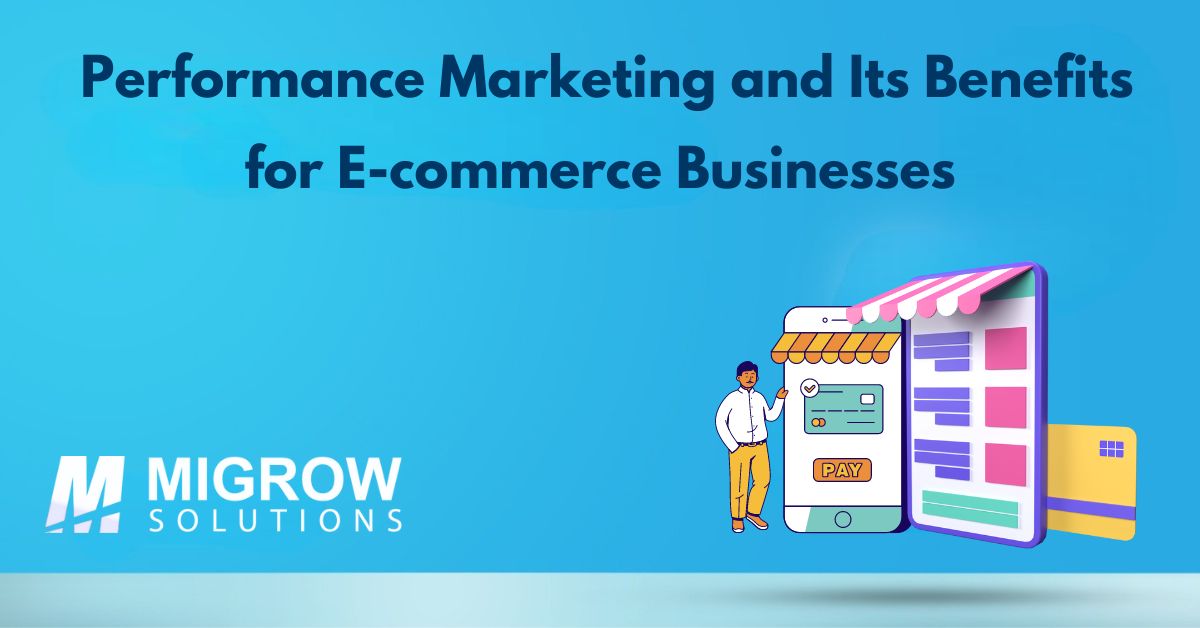
Understanding Performance Marketing and Its Benefits for E-commerce Businesses
Performance marketing is a form of digital marketing where advertisers only pay for specific actions taken by users, such as clicks, sales, or leads. This approach allows for more efficient use of marketing budgets and provides measurable results, making it an attractive strategy for e-commerce businesses looking to optimize their marketing efforts and drive more leads.
Key Aspects of Performance Marketing
Pay-Per-Click (PPC) Advertising
Description: Advertisers pay each time a user clicks on their ad. PPC campaigns can be run on platforms like Google Ads, Bing Ads, and social media networks.
Benefit: Immediate traffic to your website with targeted ads that can be adjusted based on performance.
Affiliate Marketing
Description: Partners (affiliates) promote your products on their platforms and earn a commission for every sale or lead generated through their referral links.
Benefit: Leverages the affiliate’s audience to expand reach and drive sales without upfront costs.
Social Media Advertising
Description: Paid ads on social media platforms such as Facebook, Instagram, Twitter, and LinkedIn to reach specific demographics and interests.
Benefit: Highly targeted advertising with the ability to engage users through interactive content.
Search Engine Optimization (SEO)
Description: Techniques to improve your website’s organic search rankings on search engines like Google.
Benefit: Increases visibility and attracts high-quality traffic over the long term without direct ad spend.
Content Marketing
Description: Creating and distributing valuable, relevant content to attract and engage a target audience.
Benefit: Builds brand authority and drives organic traffic through SEO-optimized content.
Email Marketing
Description: Sending targeted emails to a segmented audience to nurture leads and drive conversions.
Benefit: Cost-effective way to maintain customer relationships and encourage repeat purchases.
Influencer Marketing
Description: Collaborating with influencers to promote your products to their followers.
Benefit: Leverages the influencer’s credibility and reach to generate interest and sales.
Retargeting Ads
Description: Displaying ads to users who have previously visited your website but did not convert.
Benefit: Re-engages potential customers who have shown interest in your products.
How Performance Marketing Helps E-commerce Businesses Excel
Cost Efficiency
Description: Since you only pay for specific actions, performance marketing ensures that your budget is spent on actual results rather than just impressions.
Benefit: Maximizes ROI and reduces wasted ad spend.
Measurable Results
Description: Detailed analytics and reporting tools allow you to track every aspect of your campaign’s performance.
Benefit: Provides clear insights into what’s working and what’s not, enabling data-driven decisions.
Targeted Advertising
Description: Advanced targeting options allow you to reach the right audience based on demographics, interests, and behaviors.
Benefit: Increases the likelihood of conversions by focusing on high-potential customers.
Scalability
Description: Performance marketing campaigns can be easily scaled up or down based on performance and budget.
Benefit: Allows for flexible marketing strategies that can adapt to business growth.
Improved Conversion Rates
Description: Techniques like retargeting and personalized content help to convert more visitors into customers.
Benefit: Enhances the overall efficiency of your sales funnel.
Enhanced Customer Insights
Description: Collecting data on customer interactions helps to understand their preferences and behaviors better.
Benefit: Informs future marketing strategies and product development.
Getting More Leads with Performance Marketing
Optimize Landing Pages
Ensure your landing pages are optimized for conversions with clear calls-to-action (CTAs), compelling copy, and user-friendly design.
Leverage Data Analytics
Use analytics tools to track user behavior and campaign performance. Adjust your strategies based on the insights gained.
A/B Testing
Continuously test different ad creatives, headlines, and CTAs to determine what resonates best with your audience.
Personalize Marketing Efforts
Utilize customer data to personalize ads and content, making them more relevant to the individual user.
Build Strong Affiliate Partnerships
Collaborate with reputable affiliates who have a strong influence in your niche to expand your reach and generate more leads.
Invest in SEO
Enhance your website’s SEO to attract organic traffic and improve visibility in search engine results.
Conclusion
Performance marketing is a powerful strategy for e-commerce businesses looking to optimize their marketing spend and drive more leads. By focusing on specific, measurable actions and leveraging various digital marketing techniques, businesses can achieve better results and maximize their ROI. For those seeking to implement performance marketing effectively, partnering with an experienced agency like Migrow Solution, the best digital marketing agency in Chennai, can provide the expertise and tools needed to excel in today’s competitive market.


